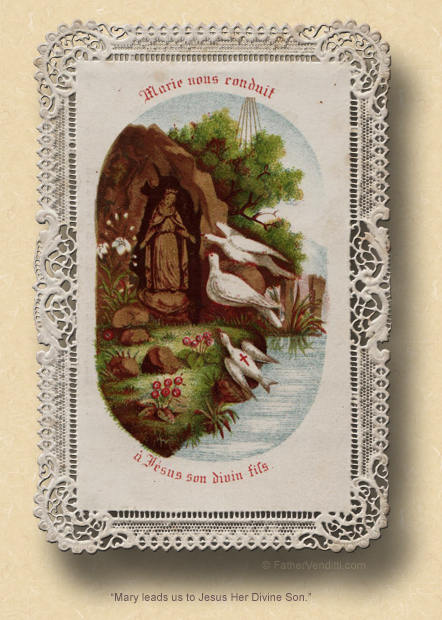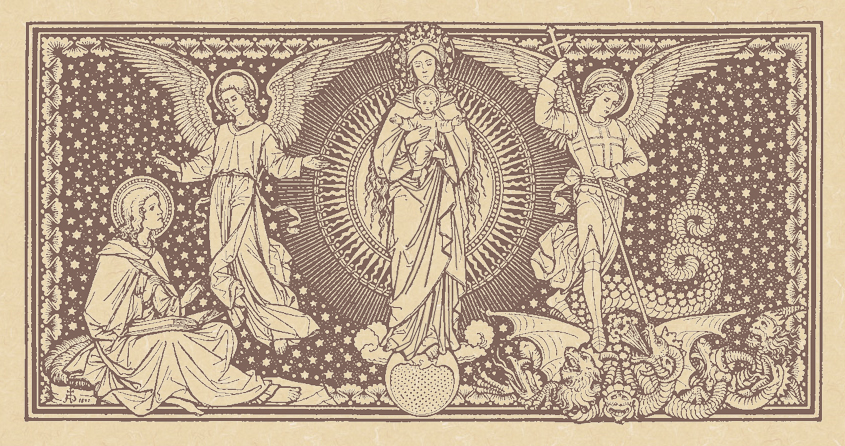There is No Such Thing as Love Separated from Truth.
The Sixteenth Tuesday of Ordinary Time; or, the Memorial of Saint Bridget, Religious.*
Lessons from the primary feria, according to the ordinary form of the Roman Rite:
• Exodus 14: 12—15: 1.
• [Responsorial] Exodus 15: 8-10, 12, 17.
• Matthew 12: 46-50.
|
If a Mass for the memorial is taken, lessons from the feria as above, or from the proper:
• Galatians 2: 19-20.
• Psalm 34: 2-11.
• John 15: 1-8.
…or, any lessons from the common of Holy Men & Women for Holy Women, or the same common for Religious.
|
The Third Class Feast of Saint Apollinaris, Bishop & Martyr; and, the Commemoration of Saint Liborius, Bishop & Confessor.**
Lessons from the proper, according to the extraordinary form of the Roman Rite:
• I Peter 5: 1-11.
• Psalm 88: 21-23.
• Luke 22: 24-30.
|
If a Mass for the commemoration is taken, lessons from the common "Státuit…" for a Confessor Bishop:
• Eccesiasticus 44: 16-27; 45: 3-20.
• [Gradual] Ecclesiasticus 44: 16, 20.
• Matthew 25: 14-23.
|
FatherVenditti.com
|
 9:37 AM 7/23/2019 — The Gospel lesson presented to us today is one of two which routinely crops up on so many feasts of the Mother of God: “Here are my mother and my brethren! If anyone does the will of my Father who is in heaven, he is my brother, and sister, and mother” (Matt. 12: 49-50 Knox); the other being from Luke: “'Blessed is the womb that bore thee, the breast which thou hast sucked.' And he answered, 'Shall we not say, Blessed are those who hear the word of God, and keep it?'” (Luke 11: 27-28 Knox). 9:37 AM 7/23/2019 — The Gospel lesson presented to us today is one of two which routinely crops up on so many feasts of the Mother of God: “Here are my mother and my brethren! If anyone does the will of my Father who is in heaven, he is my brother, and sister, and mother” (Matt. 12: 49-50 Knox); the other being from Luke: “'Blessed is the womb that bore thee, the breast which thou hast sucked.' And he answered, 'Shall we not say, Blessed are those who hear the word of God, and keep it?'” (Luke 11: 27-28 Knox).
And there's a part of us, I think, that is uncomfortable with these verses being read on feasts of the Mother of God, since they seem to show our Blessed Lord slighting His Mother. In both passages, someone unnamed is praising the Blessed Virgin, and our Lord corrects them and draws attention instead to devotion to the will of His Father.
Saint John Paul II chose to analyze these verses in relation to what Jesus said to Mary and Joseph when they found Him in the Temple after their three-day search: “What reason had you to search for me? Could you not tell that I must needs be in the place which belongs to my Father?” (Luke 2: 49 Knox). He points out that, from His earliest days, Jesus was dedicated to His relationship with his Father:
He announced the Kingdom [he says]: the “Kingdom of God” and his “Father's business”, which add a new dimension and meaning to everything human, and therefore to every human bond, insofar as these things relate to the goals and tasks assigned to every human being. Within this new dimension, a bond such as that of “brotherhood” also means something different from “brotherhood according to the flesh” deriving from a common origin from the same set of parents. “Motherhood”, too, in the dimension of the Kingdom of God and in the radius of the fatherhood of God himself, takes on another meaning (Redemptoris Mater, 20).
Now, that's certainly a mouthful, as Saint John Paul tends to provide, but all it really means is that the Lord teaches us, again and again, that doing the will of God transcends the demands of every human relationship, even that of the family.
I will never forget the example of a man I was with in the seminary. He was from Kansas, and was the son of very committed Protestants who had grown up, as many Protestant fundamentalist do, hating the Catholic Church, believing it to be an agent of Satan. He was converted to the faith in college, and knew that, when he left to go the seminary, he would never speak to his parents again. Thankfully, most of us will never be required by our Lord to make such a choice, but it's instructive for us to keep in mind that there have been—and are—people who do. Among other things, it's food for reflection: would we be able to make that choice if our Lord required it of us?
Now, Saint John Paul, who was no slouch when it came to understanding and explaining devotion to the Mother of God, goes one to explain:
Is Jesus thereby distancing himself from his mother according to the flesh? Does he perhaps wish to leave her in the hidden obscurity which she herself has chosen? If this seems to be the case from the tone of those words, one must nevertheless note that the new and different motherhood which Jesus speaks of to his disciples refers to Mary in a very special way (loc cit).
 …which is just his characteristically opaque way of saying that, if we are truly devoted to our Lord, then we end up loving those dear to us in the flesh even more, because we will come to desire what is best for them, namely, that they, too, be brought to conversion and faith and so secure their eternal salvation. In the case of our Lord's love for His Mother, He desires to illustrate for His disciples the fact that any love for Mary that's detached from the love of God and from following Him is misplaced, and this was something so clearly explained by Saint Louis de Montfort, as you know, in True Devotion to the Blessed Virgin Mary. Devotion to the Mother of God cannot become a religion unto itself, and the example of our Lord shows this. Jesus loves His Mother in a singular way since she is His Mother according to the flesh, but He loves Her even more—and is more intimately united with Her—because of Her faithfulness to Her vocation. Hence, the Fathers of the Second Vatican Council reminded us that the Mother of God… …which is just his characteristically opaque way of saying that, if we are truly devoted to our Lord, then we end up loving those dear to us in the flesh even more, because we will come to desire what is best for them, namely, that they, too, be brought to conversion and faith and so secure their eternal salvation. In the case of our Lord's love for His Mother, He desires to illustrate for His disciples the fact that any love for Mary that's detached from the love of God and from following Him is misplaced, and this was something so clearly explained by Saint Louis de Montfort, as you know, in True Devotion to the Blessed Virgin Mary. Devotion to the Mother of God cannot become a religion unto itself, and the example of our Lord shows this. Jesus loves His Mother in a singular way since she is His Mother according to the flesh, but He loves Her even more—and is more intimately united with Her—because of Her faithfulness to Her vocation. Hence, the Fathers of the Second Vatican Council reminded us that the Mother of God…
…received the words whereby, in extolling a kingdom beyond the calculations and bonds of flesh and blood, He declared blessed those who heard and kept the word of God, as she was faithfully doing (Lumen Gentium, 58).
“If anyone does the will of my Father who is in heaven, he is my brother, and sister, and mother.” The Opus Dei priest, Francis Fernandez, in his series of daily meditations,*** speculates whether our Lady was there to hear these words or, if not, whether someone there repeated them to Her, and asks rhetorically whether She would have been offended by them. And, of course, we know the answer: Mary abandoned Herself completely to the will of God when She became His Mother in the flesh at the Annunciation, and She's not about to retreat into a mere human jealousy, as if that never happened. She always was—and always is—focused on guiding us to Her Son.
But, back to the point: as disciples of our Lord—and of our Lady—we all know that we need to cultivate a certain detachment from the things of this world, but we don't often consider that one of the “things of this world” from which we must sometimes become detached is our human relationships. I guess the question is: to what extent have we fostered a real kinship with Christ in prayer? To what extent have we united ourselves to Him in the Blessed Eucharist? For those called to the priesthood or religious life, it's all very explicit, since once one is bound by obedience to the Church, obligations to one's family must become secondary; but, even for those not called to such a special vocation, obedience to Christ and His Church can sometimes be very painful, sometimes causing a rift in the family that gets everyone mad at us; but, we stick to our guns, not because of any kind of self-righteousness or judgmental-ism—which is the accusation always thrown back at us—but because, in reality, our love for our family runs deeper than the family understands: true love desires what is best for the one loved, and what's best for the one loved is eternal salvation; or, as Saint John Paul said several times when addressing this specific question: “There is no such thing as love separated from truth.” Perhaps an ironic thought on the feast of Saint Bridget, who served as wife, mother and nun in the course of her full life, but true nonetheless.
Actually, the best example of this comes from our Lady Herself: She cares for each one of us as if each of us was Her only child. She watches out for our sanctity and our salvation as if She had no other children on earth. Does Her love for us mean that She loves Her Son less?

* Born in Sweden in 1303, Bridget was the mother of eight children, including the future St. Catherine of Sweden. After her husband's death, she dedicated herself to an ascetical and contemplative life; and, after a brief time as a Franciscan tertiary, founded the Order of the Most Holy Savior (the "Bridgettines"). Along with St. Catherine of Siena, she was instrumental in ending the luxury and dissipation of the Avignon papacy, pressuring the pope to return to Rome. She died in Rome in 1373. She is the patroness of Sweden; and, in 1999 Pope St. John Paul II declared her, along with St. Catherine of Siena and St. Teresa Benedicta of the Cross (Edith Stein), co-patroness of Europe.
** Tradition holds that Apollinaris was consecrated a bishop by St. Peter, himself, and sent to Ravenna on the Adriatic coast during the reign of Claudius. Renowned as a healer, he was exiled, tortured, imprisoned and finally beaten to death c. AD 79.
Liborius, a Gaul, was Bishop of Le Mans in France and died in AD 395.
*** In Conversation with God, 1991 by Scepter Press, originally in Spanish in 1989.
|

